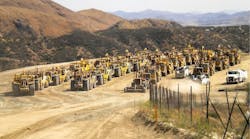Xcel Energy will submit an application to the Public Service Commission of Wisconsin (PSCW) to install pioneering technology at the Bay Front Power Plant in Ashland, WI, to allow it to generate electricity from biomass in all three operating units. When completed, at a cost of $55 to $70 million, the Bay Front Power Plant will be the largest biomassfueled power plant in the Midwest and one of the largest in the nation.
"The Bay Front project reflects our increased focus on environmental leadership and designing a clean energy future for our customers and communities," said Dick Kelly, president and CEO, Xcel Energy. "As part of this effort, we are investing in advanced energy technologies and improving the environmental performance of our existing generating resources. These efforts combined contribute to our goal to reduce carbon dioxide by 22 percent from 2005 levels on our Midwest generation system by 2020."
In Wisconsin, Xcel Energy is the No. 1 renewable energy provider and generates 11 percent of its electricity from a diverse portfolio of renewable sources such as water, wind, refuse-derived fuel and biomass.
For three consecutive years, the American Wind Energy Association has named Xcel Energy the nation's No. 1 wind energy provider. With 2,700 MW of wind power currently on its system, Xcel Energy has plans to reach about 7,400 MW of wind by 2020. Xcel Energy also ranks No. 5 in solar energy according to the Solar Electric Power Association.
Waste Wood Generates Electricity
In 1979, the Bay Front Power Plant became the first investor-owned utility plant in the nation to burn waste wood to generate electricity. Since then, the plant has burned nearly four million tons of waste wood to make power. Bay Front is unique in that it has been retrofitted to be a "flex fuel" plant capable of burning multiple fuels in its three boilers.
Currently, two of the three operating units use biomass as their primary fuel to generate electricity. This innovative project will convert the existing coal -fired unit to biomass gasification technology allowing the plant to use 100 percent biomass in all three boilers.
This is the first time biomass gasification technology will be used to convert a coal-fired boiler at an existing base-load power plant. The project is expected to cost $55-$70 million.
In this process, biomass (waste wood) reacts with a controlled amount of oxygen at high temperatures to create a gas mixture called synthetic gas ("syngas") that is then used as a fuel in the boiler. By converting the biomass to gas, the resulting fuel is much cleaner and has far fewer emissions than coal.
"This project continues our commitment to meet the needs of our customers in an environmentally responsible, sustainable manner," said Mike Swenson, president and CEO, NSP-Wisconsin, an Xcel Energy company. "In addition to reducing carbon dioxide emissions, this project will drastically reduce other air emissions."
When complete and operational, the project will reduce emissions of nitrogen oxides by 50 percent, sulfur dioxides by more than 85 percent and particulate matter by 90 percent. In addition, displacing coal with sustainably harvested biomass will also reduce net carbon dioxide emissions, contributing to the state of Wisconsin’s goals.
Will Provide Electricity for 40,000 Homes
The biomass used at Bay Front comes primarily from waste wood from area forest harvest operations. Local independent contractors secure the waste wood and transport it to the plant where it is used to generate electricity. The plant currently uses just over 200,000 tons of waste wood each year. When the project is complete, the plant will use an additional 185,000-250,000 tons per year, and be able to generate enough renewable electricity to serve 40,000 homes.
In 2006, Xcel Energy funded a study with the Energy Center of Wisconsin to investigate the amount of biomass that could be removed from Wisconsin's forests to support sustainable energy resources and any associated environmental impacts. The study concluded that area forests within a 50-mile radius of the Bay Front Power Plant could support additional biomass removal without adverse impacts to the local ecosystem.
Dedicated biomass energy plantations could ultimately provide a portion of the plant’s increased biomass needs, with additional benefits from carbon sequestration.
"Xcel Energy has been a long-time leader in providing renewable energy from local sources to the citizens of Wisconsin," said Michael Vickerman, executive director, RENEW Wisconsin. "This biomass initiative continues that tradition."
Mark Redsten, executive director, Clean Wisconsin, agreed. "This project will both lessen Wisconsin's reliance on imported fossil fuels and propel us closer to the renewable energy goals of Gov. Doyle's Task Force on Global Warming," Redsten said.
$20 Million Impact on Local Economy
The Bay Front Power Plant is also an economic engine for communities in northern Wisconsin. Through its purchases of waste wood and related services, the plant has a $20 million annual economic impact on a six-county region around Ashland. Area officials expect that support to increase as the plant purchases more waste wood from area contractors.
"This is exciting news for the City of Ashland," said Ashland Mayor Ed Monroe. "Xcel Energy is committing to convert and further upgrade the Bay Front Power Plant to run almost exclusively on biomass. This will help further our commitment to move toward renewable energy and our commitment to the sustainable goals of being an eco-municipality."
"Xcel Energy has been at the forefront providing upgrades to its generating and transmission facilities in Ashland and our surrounding region. These investments not only provide jobs and a huge economic impact to the Ashland area, they also add to the stability of our economy and our sources of electricity."
In 2005, Ashland became the second city in Wisconsin to become an "eco-municipality" and adopt the community development principles of sustainability. "Eco-municipality" communities strive to unite an economic and ecological balance in a common development strategy based on an area’s natural resources, environmental values, commercial and industrial structure, and local lifestyles.
Contingent upon final approval by the Xcel Energy Board of Directors, the company expects to file an application with the PSCW later this fall. Following all state regulatory approvals, engineering, design and construction work is expected to begin in 2010 and the unit could be operational in late 2012.



